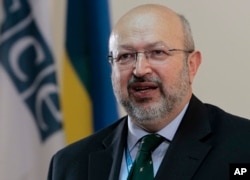The head of the Organization for Security and Cooperation in Europe warned this week that if the parties to the Ukraine conflict do not clearly commit to implementing the Minsk agreement, the situation in eastern Ukraine could quickly escalate.
OSCE Secretary-General Lamberto Zannier told VOA in an interview that there is mistrust between the Ukrainian forces who have been fighting the Russian-backed separatists in eastern Ukraine for nearly three years.
"We might see another spike of violence as we saw at the beginning of the month. All in all, we are rather concerned about the situation," Zannier said.
In early February, thousands of civilians in the eastern city of Avdiivka were left without water, electricity and heat in subzero temperatures when fighting flared, worsening an already difficult humanitarian situation.
Adding to concerns about renewed and fierce fighting, the region remains far from a full and sustainable cease-fire.
"The cease-fire that has been agreed upon at the Normandy meeting in Munich a few days ago, it is not really respected. We see quite a number of violations still," Zannier said, adding that the withdrawal of heavy weapons has also been unsatisfactory.
Further complicating the situation, he says, is the recent Russian move to recognize passports and other travel documents issued by the separatist authorities.
"The issue is not so much the recognition of the documents itself, but it is the implicit recognition of the authorities which issue the documents," Zannier said.
That could stiffen the resolve of the rebels and make talks to fulfill obligations to the 2015 agreement even more difficult, he added, stressing that Minsk is "the only game in town" and progress is needed on its implementation.
He noted that Moscow's decision to recognize the passports came at a notable moment.
"I think it is interesting this announcement came at a time when Vice President [Mike] Pence in Munich was reaffirming a strong U.S. commitment to NATO, and was reaffirming a firm condemnation of the actions of the Russian Federation in Ukraine," he said.
The OSCE has a contingent of about 600 unarmed international civilian monitors in eastern Ukraine as part of its effort to monitor the security and humanitarian situation. The special monitoring mission, as it is called, has faced numerous obstacles carrying out its mandate, including restrictions on its movement. This has led to the mission relying more on technology to be its eyes and ears — but that, too, has not gone smoothly.
The mission has employed fixed cameras and unmanned aerial drones to gather data. Zannier reports at least eight large drones have been shot down, mainly in separatist-controlled areas.
"They are very costly equipment and we suspended the operation of those very expensive ones," he said.
Now the mission is opting for short- and medium-range drones that are much less expensive, so they can absorb the cost if more are lost.





